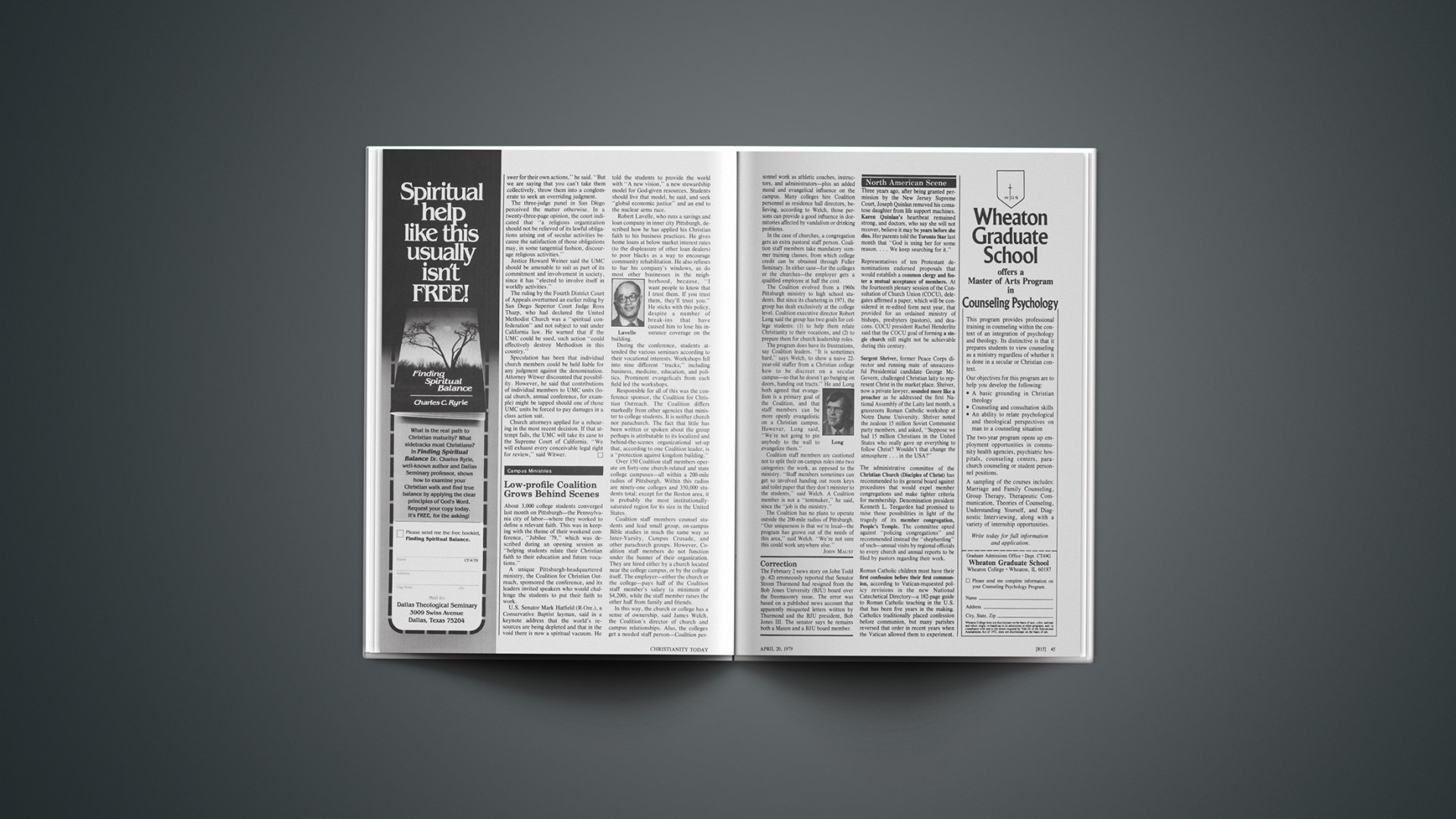About 3,000 college students converged last month on Pittsburgh—the Pennsylvania city of labor—where they worked to define a relevant faith. This was in keeping with the theme of their weekend conference, “Jubilee ’79,” which was described during an opening session as “helping students relate their Christian faith to their education and future vocations.”
A unique Pittsburgh-headquartered ministry, the Coalition for Christian Outreach, sponsored the conference, and its leaders invited speakers who would challenge the students to put their faith to work.
U.S. Senator Mark Hatfield (R-Ore.), a Conservative Baptist layman, said in a keynote address that the world’s resources are being depleted and that in the void there is now a spiritual vacuum. He told the students to provide the world with “A new vision,” a new stewardship model for God-given resources. Students should live that model, he said, and seek “global economic justice” and an end to the nuclear arms race.
Robert Lavelle, who runs a savings and loan company in inner city Pittsburgh, described how he has applied his Christian faith to his business practices. He gives home loans at below market interest rates (to the displeasure of other loan dealers) to poor blacks as a way to encourage community rehabilitation. He also refuses to bar his company’s windows, as do most other businesses in the neighborhood, because, “I want people to know that I trust them. If you trust them, they’ll trust you.” He sticks with this policy, despite a number of break-ins that have caused him to lose his insurance coverage on the building.
During the conference, students attended the various seminars according to their vocational interests. Workshops fell into nine different “tracks;” including business, medicine, education, and politics. Prominent evangelicals from each field led the workshops.
Responsible for all of this was the conference sponsor, the Coalition for Christian Outreach. The Coalition differs markedly from other agencies that minister to college students. It is neither church nor parachurch. The fact that little has been written or spoken about the group perhaps is attributable to its localized and behind-the-scenes organizational set-up that, according to one Coalition leader, is a “protection against kingdom building.”
Over 150 Coalition staff members operate on forty-one church-related and state college campuses—all within a 200-mile radius of Pittsburgh. Within this radius are ninety-one colleges and 350,000 students total; except for the Boston area, it is probably the most institutionally-saturated region for its size in the United States.
Coalition staff members counsel students and lead small group, on-campus Bible studies in much the same way as Inter-Varsity, Campus Crusade, and other parachurch groups. However, Coalition staff members do not function under the banner of their organization. They are hired either by a church located near the college campus, or by the college itself. The employer—either the church or the college—pays half of the Coalition staff member’s salary (a minimum of $4,200), while the staff member raises the other half from family and friends.
In this way, the church or college has a sense of ownership, said James Welch, the Coalition’s director of church and campus relationships. Also, the colleges get a needed staff person—Coalition personnel work as athletic coaches, instructors, and administrators—plus an added moral and evangelical influence on the campus. Many colleges hire Coalition personnel as residence hall directors, believing, according to Welch, those persons can provide a good influence in dormitories affected by vandalism or drinking problems.
In the case of churches, a congregation gets an extra pastoral staff person. Coalition staff members take mandatory summer training classes, from which college credit can be obtained through Fuller Seminary. In either case—for the colleges or the churches—the employer gets a qualified employee at half the cost.
The Coalition evolved from a 1960s Pittsburgh ministry to high school students. But since its chartering in 1971, the group has dealt exclusively at the college level. Coalition executive director Robert Long said the group has two goals for college students: (1) to help them relate Christianity to their vocations, and (2) to prepare them for church leadership roles.
The program does have its frustrations, say Coalition leaders. “It is sometimes hard,” says Welch, to show a naive 22-year-old staffer from a Christian college how to be discreet on a secular campus—so that he doesn’t go banging on doors, handing out tracts.” He and Long both agreed that evangelism is a primary goal of the Coalition, and that staff members can be more openly evangelistic on a Christian campus. However, Long said, “We’re not going to pin anybody to the wall to evangelize them.”
Coalition staff members are cautioned not to split their on-campus roles into two categories: the work, as opposed to the ministry. “Staff members sometimes can get so involved handing out room keys and toilet paper that they don’t minister to the students,” said Welch. A Coalition member is not a “tentmaker,” he said, since the “job is the ministry.”
The Coalition has no plans to operate outside the 200-mile radius of Pittsburgh. “Our uniqueness is that we’re local—the program has grown out of the needs of this area,” said Welch. “We’re not sure this could work anywhere else.”
Correction
The February 2 news story on John Todd (p. 42) erroneously reported that Senator Strom Thurmond had resigned from the Bob Jones University (BJU) board over the freemasonry issue. The error was based on a published news account that apparently misquoted letters written by Thurmond and the BJU president, Bob Jones III. The senator says he remains both a Mason and a BJU board member.










